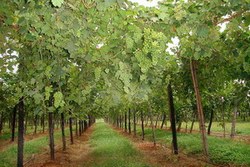In Pinar del Río, Cuba Grapes, more than exotic
- Submitted by: admin
- Caribbean
- history
- national
- Pinar del Río
- Business and Economy
- 08 / 17 / 2008

The phrase sounds as a provocation; but ratifies the thesis of the professor. Why in a same community, just with a fence in between, a grower has better results than his neighbour?
To grow grapes in the province was an almost unusual fact; as it happened with the first potato harvests in La Palma municipality.
But when there is a will things turn out better.
Carlos Ibrahim Hernandez Crespo, Economy graduate, in charge of the vineyard, tells how this experience started with the EJT and a reduced number of civil workers.
The vineyard began to be built in 2001, today there are 12, 2 hectares planted and its production is destined to a wine producer plant in San Cristobal and to agricultural markets, some of them in Pinar del Río.
Can grapes be planted anywhere? Of course not, since they may produce no fruits at all.
Formerly, Los Palacios municipality tried to develop those plantations and it brought out none results. Then the task was assigned to the EJT.
In the region known as Bermejales, the mentioned number of hectares is attended by only six civilian workers of the Revolutionary Armed Forces (FAR), whose salary depends on the results of their work.
The exotic attraction
Many people have tried to grow grapes in their yards and have not achieved it, attracted by an unusual growing in Cuba.
The soils of Bermejales are red ferralitic. Studies made to them and to other issues like the weather, the temperature and the light hours, gave the necessary results to start planting, which would provide the raw material in order to achieve a Cuban wine production.
The growing requires a lot of cultural attention, is very susceptible to plagues and diseases.
Carlos Ibrahim confesses that at first they knew absolutely nothing about grapes. The Venezuelan consultancy resolved those obstacles. Today the sown fields may be appreciated with the two variants: bower and trellis.
The first production was obtained in 2004. The variety that yields its fruits there is the Aramón, others have not been so lucky.
The area, with a state of the art irrigation system, produces two harvests, one in June and the other in December and from this year on starts recovering what has been invested.
But they do not only grow grapes. Near the vineyard, in an open space and rustic conditions 150 chickens and 12 roosters are taken care of by one person. About 100 eggs are collected everyday.
Also in Bermejales, the EJT civil workers cleared 30 caballerias of marabou from April to the date and revived a dairy with 12 cows.
After 35 years of the foundation of the Youth Labor Army, this productive, defensive and youth trainer force, has multiple experiences on how to produce and make use of all the existing space and potentiality for it.
The land is the mother of all the wealth. We must learn to worship it as it deserves.
(PL)
Comments